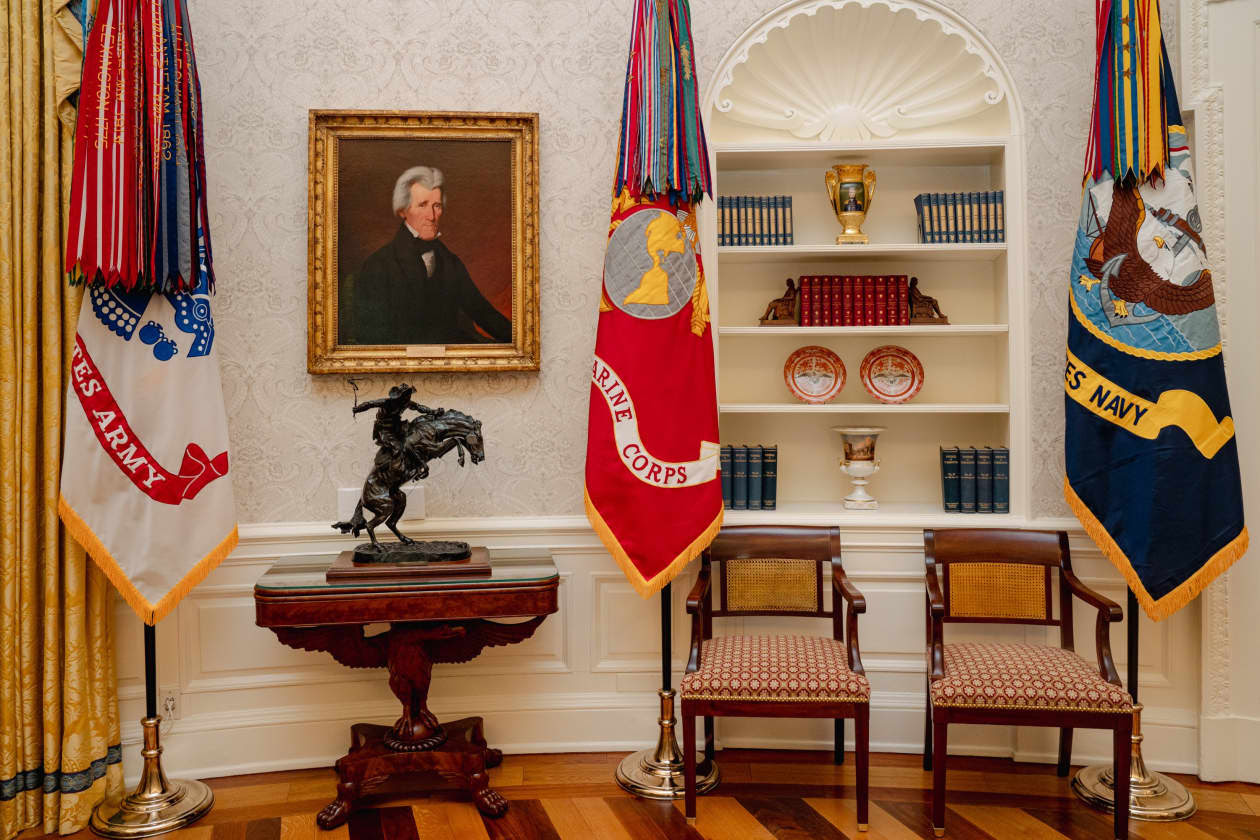
- Details
- By Neely Bardwell
As the transfer of power from one president to another occurs, so does a transformation of the Oval Office's decor. Each president is allowed to select their preferred carpet and drapery colors, as well as statues and portraits.
On Monday, President Donald Trump brought a portrait of Andrew Jackson, the seventh president of the United States, back to the Oval Office.
In 2017, when President Trump first took office and revealed his decor choices, many in Indian Country expressed outrage over the inclusion of a painting of Andrew Jackson, a president associated with assimilationist and genocidal policies, who has been infamously dubbed the “Indian killer.”
“The Trump 2.0 version of Jackson’s portrait hails from the White House art collection. In his first term, Trump had a portrait of Jackson that was on loan from the U.S. Naval Academy,” the Wall Street Journal Exclusive wrote.
Among Native people, Jackson is commonly referred to as the “removal president” and the “Indian killer” because he signed the Indian Removal Act that stole millions of acres of lands from tribes that led to the forced removal from tribal ancestral lands to west of the Mississippi. The harsh removal campaign is commonly referred to as the Trail of Tears, which resulted in thousands of deaths of Native Americans.
The Trump administration this time around ignored the ire of Native Americans who were opposed to the portrait of Jackson displayed in the Oval Office during Trump's first term. In particular, Native Americans did not approve of Trump honoring Navajo Code Talkers with the Jackson painting in the background in November 2017.
When President Joe Biden took office, he had the painting of Andrew Jackson removed and replaced with a portrait of Benjamin Franklin and art from Apache sculptor Allan Houser, a decision that was welcomed by Indian Country.
President Jackson did not think highly of the Native people. In his own words, Jackson voiced his opinion of American Indians:
“My original convictions upon this subject have been confirmed by the course of events for several years, and experience is every day is adding to their strength. That those tribes cannot exist surrounded by our settlements and in continual contact with our citizens is certain. They have neither the intelligence, the industry, the moral habits, nor the desire of improvement which are essential to any favorable change in their condition. Established in the midst of another and superior race, and without appreciating the causes of their inferiority or seeking to control them, they must necessarily yield to the force of circumstances and ere long disappear.”
More Stories Like This
Native News Weekly (August 25, 2024): D.C. BriefsScope Narrowed, Report Withheld: Questions Mount Over Michigan Boarding School Study
Zuni Youth Enrichment Project Announces Family Engagement Night and Spring Break Youth Programming
Next on Native Bidaské: Leonard Peltier Reflects on His First Year After Prison
Deb Haaland Rolls Out Affordability Agenda in Albuquerque
Help us defend tribal sovereignty.
At Native News Online, our mission is rooted in telling the stories that strengthen sovereignty and uplift Indigenous voices — not just at year’s end, but every single day.
Because of your generosity last year, we were able to keep our reporters on the ground in tribal communities, at national gatherings and in the halls of Congress — covering the issues that matter most to Indian Country: sovereignty, culture, education, health and economic opportunity.
That support sustained us through a tough year in 2025. Now, as we look to the year ahead, we need your help right now to ensure warrior journalism remains strong — reporting that defends tribal sovereignty, amplifies Native truth, and holds power accountable.
 The stakes couldn't be higher. Your support keeps Native voices heard, Native stories told and Native sovereignty defended.
The stakes couldn't be higher. Your support keeps Native voices heard, Native stories told and Native sovereignty defended.
Stand with Warrior Journalism today.
Levi Rickert (Potawatomi), Editor & Publisher


